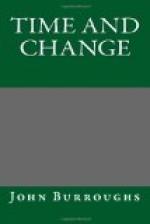We know that no man is born of full stature, with his hat and boots on; we know that he grows from an infant, and we know the infant grows from a fetus, and that the fetus grows from a bit of nucleated protoplasm in the mother’s womb. Why may not the race of man grow from a like simple beginning? It seems to be the order of nature; it is the order of nature,—first the germ, the inception, then the slow growth from the simple to the complex. It is the order of our own thoughts, our own arts, our own civilization, our own language.
In our candid moments we acknowledge the animal in ourselves and in our neighbors,—especially in our neighbors,—the beast, the shark, the hog, the sloth, the fox, the monkey; but to accept the notion of our animal origin, that gives us pause. To believe that our remote ancestor, no matter how remote in time or space, was a lowly organized creature living in the primordial seas with no more brains than a shovel-nosed shark or a gar-pike, puts our scientific faith to severe test.
Think of it. For countless ages, millions upon millions of years, we see the earth swarming with life, low bestial life, devouring and devoured, myriads of forms, all in bondage to nature or natural forces, living only to eat and to breed, localized, dependent upon place and clime, shaped to specific ends like machines,—to fly, to swim, to climb, to run, to dig, to drill, to weave, to wade, to graze, to crush,—knowing not what they do, as void of conscious purpose as the thorns, the stings, the hooks, the coils, and the wings in the vegetable world, making no impression upon the face of nature, as much a part of it as the trees and the stones, species after species having its day, and then passing off the stage, when suddenly, in the day before yesterday in the geologic year, so suddenly as to give some color of truth to the special creation theory, a new and strange animal appears, with new and strange powers, separated from the others by what appears an impassable gulf, less specialized in his bodily powers than the others, but vastly more specialized in his brain and mental powers, instituting a new order of things upon the earth, the face of which he in time changes through his new gift of reason, inventing tools and weapons and language, harnessing the physical forces to his own ends, and putting all things under his feet,—man the wonder-worker, the beholder of the stars, the critic and spectator of creation itself, the thinker of the thoughts of God, the worshiper, the devotee, the hero, spreading rapidly over the earth, and developing with prodigious strides when once fairly launched upon his career. Can it be possible, we ask, that this god was fathered by the low bestial orders below him,—instinct giving birth to reason, animal ferocity developing into human benevolence, the slums of nature sending forth the ruler of the earth. It is a hard proposition, I say, undoubtedly the hardest that science has ever confronted us with.




